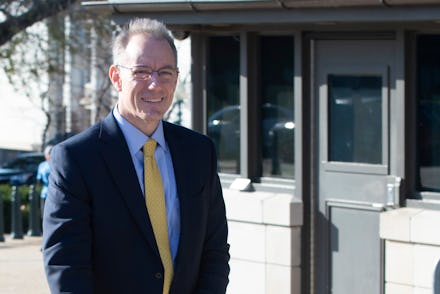Two White House officials resigned over Ukrainian aid freeze, transcript reveals

Yesterday, President Donald Trump faced more blows to his impeachment inquiry defense as Democrats released transcripts from depositions that had taken place in private. The transcripts were from the interviews of Philip Reeker, who serves as the acting assistant secretary of state for European and Eurasian affairs, and Mark Sandy, the deputy associate director for national security programs within the Office of Management and Budget. Combined, the two transcripts provided a glimpse into how the Trump administration’s freezing of aid to Ukraine was being received by U.S. government officials domestically, and abroad in Ukraine.
In his testimony, which he provided on November 16th, though Sandy did resist fully speaking for other individuals, he said that two Office of Management and Budget officials had actually resigned, at least in part, because they felt unsettled by the aid to Ukraine being held up. Part of the OMB’s responsibility was to carry out the actual delivery of that aid to Ukraine after it had been approved by Congress and the Pentagon. According to Sandy, he did not know why the aid could not be administered, though he said he was essentially told by other White House officials, "'Let the hold take place' — and I'm paraphrasing here — 'and then revisit this issue with the president.'"
Sandy in his testimony brought up how one of the employees who resigned, an OMB attorney, brought up the Impoundment Control Act, suggesting that not delivering the aid was against the law. The Impoundment Control Act solidifies Congress’s “power of the purse” and was enacted to block the Executive Branch, particularly the President, from taking Congressional funding decisions and making their own substitutions for where that funding should be allocated, after the fact.
Sandy said the process of giving Ukraine that Congressionally approved aid began being held up in June. In his testimony, Sandy recounted how, at that point in June, Trump began inquiring about the money, particularly questioning how it might be used by Ukraine.
Though the stalling began in June, it wasn't until September that Sandy received an answer about why the aid was being held up, he said in another section of the testimony. September, it is important to note, is the same month the Whistleblower’s report became public, and weeks after President Trump was told about the existence of the report, and its content, by White House lawyers.
"I recall in early September an email that attributed the hold to the President's concern about other countries not contributing money to Ukraine," Sandy said.
Another crucial aspect of Sandy’s testimony was pointing out the purpose the aid served for national security on the international stage.
“The assistance to Ukraine is consistent with the national security strategy … in terms of supporting a stable, peaceful Europe,” he said. “Second was the benefit from the program in terms of opposing Russian aggression. Another argument pertained to bipartisan support for the program.”
Considering Ukraine and Russia are literally at war, the freezing of the aid was leaving Ukraine, a U.S. ally, vulnerable to the aggression of Russia, a U.S. adversary who intelligence agencies concluded interfered in the 2016 U.S. elections. In short, the freezing of the aid was not only punishing Ukraine, but also providing a gift to Russia.
In his interview, Reeker provided a good deal of testimony about his interactions with Ambassador to the European Union, Gordon Sondland, who provided explosive testimony last week.
Reeker said that Sondland told him that he had a “script” that Ukrainian President Zelensky would be using. In Sondland’s testimony, he confirmed that there had in fact been a “quid pro quo,” explaining how Ukraine had to announce investigations in order to get a White House meeting and call. Reeker testified that Sondland said throughout that he was acting based on directions from President Trump.
While Reeker’s testimony overall supported Sondland’s accusations against Trump, Reeker also undermined a part of Sondland’s testimony where the Ambassador presented himself as being naively unaware that the President and Giuliani pushing for investigations into Burisma - where former Vice President Joe Biden’s son, Hunter, sat on the board - was inherently a way to launch investigations into Biden, himself.
"It was just one of those things it was always out there, because, of course, Giuliani was talking about it and the press was writing about it all the time," said Reeker.
While these transcripts were being released by the Intelligence Committee, the House Judiciary Committee scheduled its first impeachment hearing for next week. The Judiciary Committee would be responsible for actually drafting and introducing Articles of Impeachment against President Trump, which the whole House would then vote on to decide whether or not Trump is impeached.